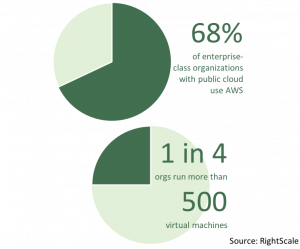In our last article we discussed the affinity engineering organizations have for AWS as their preferred cloud platform. Now we’re going to delve a bit deeper into that topic.
Amazon Web Services Rules the Cloud Kingdom
 AWS is the undisputed king of the cloud platform market.
AWS is the undisputed king of the cloud platform market.
68 percent of enterprise-class organizations with public cloud use AWS, according to a RightScale’s 2018 State of the Cloud Report. Of these, 68 percent use it for running apps, with another 15 percent using it for experimentation.
One in four organizations are using it to run more than 500 virtual machines.
Why is Amazon So Dominant Among Engineers?
One of the strongest pull factors for engineering organizations is simply the huge array of services for AWS. One archetypal example is AWS Lambda. This allows engineers the opportunity to run very small snippets of code, such as Python or JavaScript, without having to spin up an entire virtual machine. Azure has made significant inroads catching up with AWS in terms of its services, however the reputation is still there: AWS has a huge suite of services, Azure is primarily tied into Microsoft products.
As mentioned in our previous article, AWS was first to market. Additionally, AWS initially focused around pragmatic ways to configure infrastructure, lending itself more to engineering than to IT. AWS also maintains its own Linux distribution, another point of attraction for engineers. Other operating systems can work with AWS, but are of secondary importance.
One of the strongest pull factors for engineering organizations is simply the huge array of services for AWS.
What Engineers Want and Need
Compatibility and performance. That’s what engineers want and need. It’s also where AWS has primarily focused throughout its history. However, times have changed and the old categories are no longer quite so rigidly configured as they used to be.
In our next post, we’ll address the history of Azure alongside IT organizations. Similarly, much of Azure’s reputation is a matter of perception. Each cloud platform has something to offer almost every organization.
Next Steps
- Read how AWS & Azure can help turbocharge your manufacturing organization.
- Subscribe to our blog to stay informed on product development and engineering efficiency topics.
- Schedule a free consultation with a member of SPK and Associates today.







